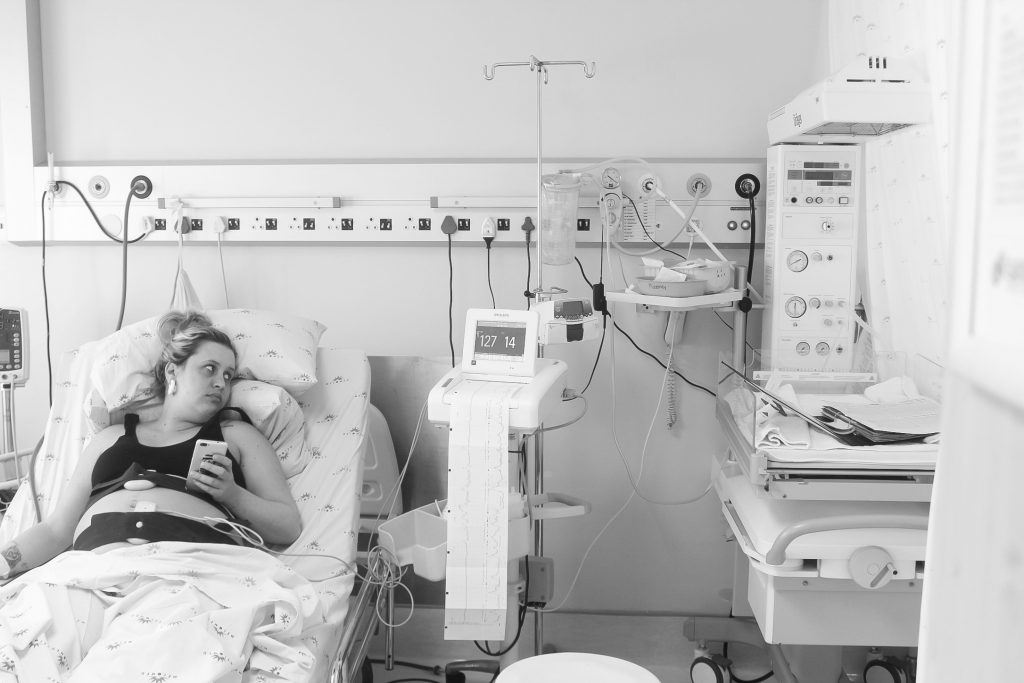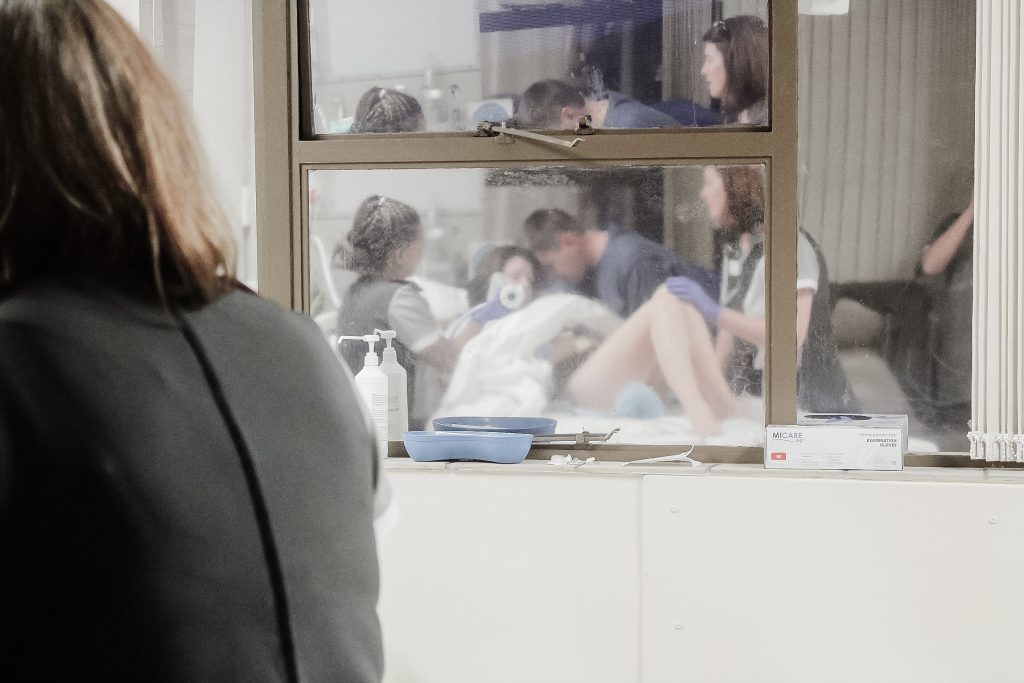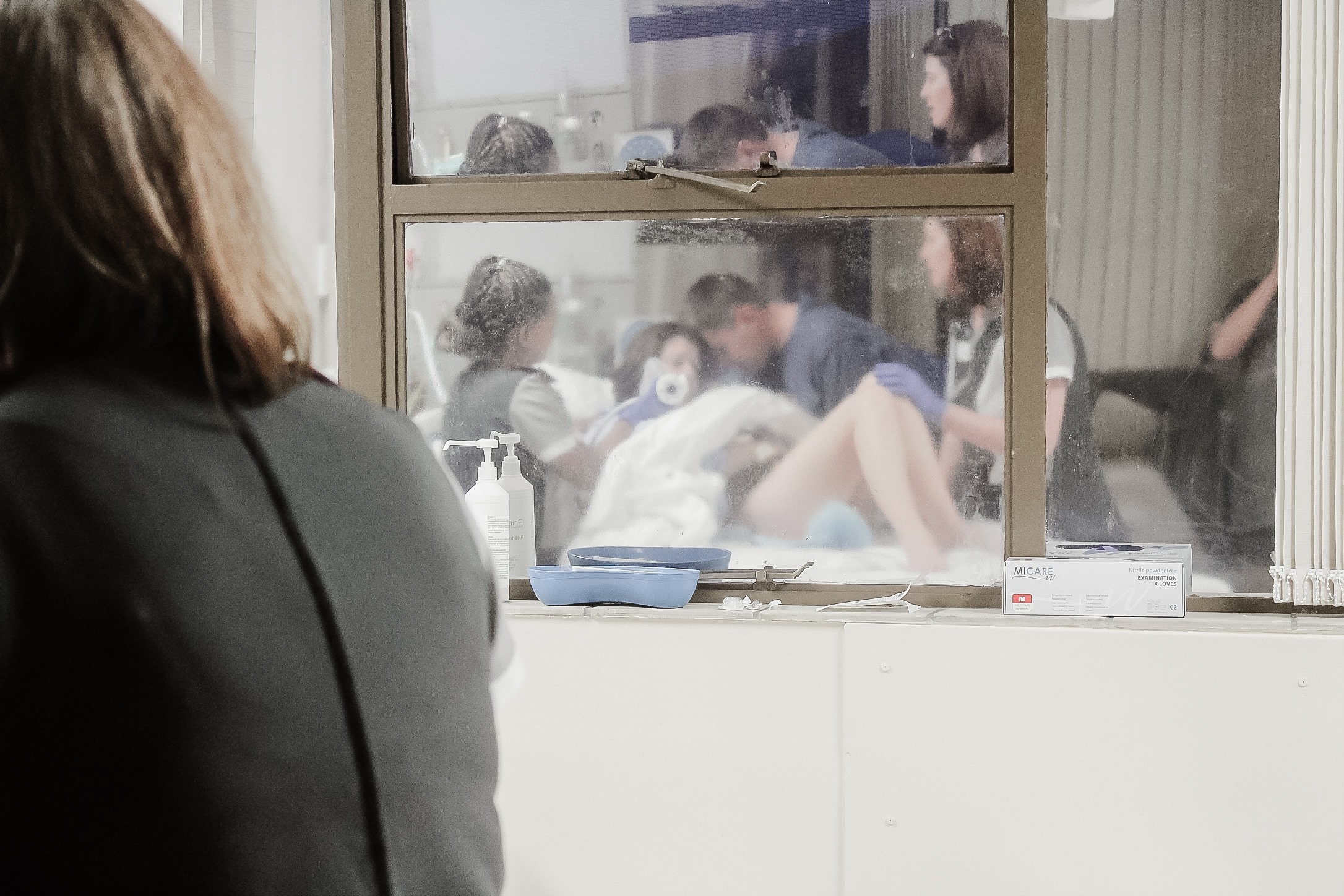I am certain every one of you can think of a pregnant mother who did not have her husband in the delivery room, couldn’t eat or drink at the hospital, was given an epidural, had to labor on her back and probably ended up meeting her baby via C-section without fully understanding the medical need for it.
Obstetric violence is a systemic and institutional problem. It is so engrained in our social practices and health systems here in Egypt that we think it’s the norm; but in reality, this is an (institutional) violation of women’s rights. We have an epidemic on our hands, and up until now, you probably didn’t even know it was a problem!
What is Obstetric Violence?
A typical “Hollywood” image of giving birth comes to mind: a half-naked pregnant woman, with a doctor between her raised legs and exposed genitals, screaming in pain and separated from her child soon after delivery.
The existing scientific literature describes obstetric violence ranging “from the denial of the comfort of a companion of choice, to lack of information about the different procedures performed during care; unnecessary cesarean sections; deprivation of the right to food and walking; routine and repetitive vaginal exams without justification; frequent use of oxytocin to accelerate labor and cutting episiotomies without consent. All these events can ultimately lead to permanent physical, mental and emotional damage.”
As a doula, I have witnessed almost all of these examples during births, from pushing hard on mama’s abdomen after the baby is born, to mamas being subjected to unnecessary and unannounced vaginal cuts, to being coerced into epidurals or given medication to accelerate labor, without being informed or consenting.
The Right to Know – Misinformation and Health Education
Obstetric violence begins with a lack of education. It begins with telling women that their voices do not have weight during their births compared to the voice of a medical professional.
Obstetric violence starts much earlier in Egypt and in the MENA region, it starts with the rampant female genital mutilation (FGM) of young girls, to the silencing of adolescents about their sexual reproductive health and rights, to a medical system that continues to see pregnant women as “sick patients” who are not able to make decisions and are not entitled to preferences or information.
Girls learn never to question anything related to sex, because it’s haram and because even mentioning that private organ down there makes you an immoral woman. Before we even know what our bodies look like or how they work, we release our power before we even hold it.
The danger then becomes that women blindly trust doctors to ultimately do what is best, forfeiting the opportunity to make an informed-decision about matters related to her body, her healing, her baby and her family.
View this post on Instagram
Violence can be simple acts of coercion and humiliation- being too intimidated to ask a question out of fear of being shamed, dismissed, or being made to feel stupid for not knowing the answer to a medical question as a first-time-pregnant mom. All too often, many mothers don’t know what questions to ask, or how to get access to the information they need; they just listen to their friends’ or their mothers’ experiences or horror stories, praying it will not happen to them.
One foreign mother and birth worker called it the “Pharaoh Syndrome”, where doctors are not used to being challenged or questioned; the expectation is that their opinions and preferences will be obeyed. The lack of education and information allows for many expecting parents to be manipulated.
In the heat of the moment, they are told that these interventions are necessary to save the baby; and while in some cases this is true, a gentle, clear and concise explanation of what is needed and a request for consent goes a long way to prevent trauma.
The Right to Stand (or Sit, Squat, Lean…)
It is likely that upward of 80 percent of Egyptian women give birth on their backs. Unfortunately, there are few doctors that will allow a pregnant woman to give birth upright, unless she is having a water-birth. The truth is this is not even a healthy or correct way to give birth!

Sadly, most of the time, it is not within the doctors’ hands, it is hospital policy, so mothers have to go down to the operating room, in case of an emergency, where they are forced to lay on their backs to push. The fact that Egypt doesn’t use nurse-midwives in hospitals, trained to catch babies in any position that a laboring woman chooses, further exacerbates this problem.
Many doctors will tell mothers even before they go into labor that they can’t handle the pain of labor and delivery, so better prepare to take an epidural.
We are at a point, now in Egyptian society, where doctors need not to say it anymore. Mothers go into their appointments requesting the epidural because they don’t know another option, and don’t want to be in pain.
Giving birth upright, using gravity to help bring the baby down, is actually healthier (for mom and baby), faster, and less-painful! What many don’t know is that staying in bed and not moving around slows down labor and makes it more painful, it can also lead to a cascade of interventions from induction, to episiotomy to using vacuum/forceps to rescue a distressed baby.
Other moms request and plan C-sections to avoid this whole headache, which contributes to Egypt having a C/S rate becoming almost 6 times higher than the global recommendation.

The Right to Consent
Exhausted and in pain from long labor, and often with an epidural, mothers will start pushing, feet in the air, which closes the space for the baby to pass through. This results in many doctors needing to perform episiotomies (cutting an additional incision at the vagina to increase the space for baby).
When asked by a pregnant client about the use of episiotomies, one esteemed Maadi doctor, replied that he much prefers them because it is much cleaner and easier for him to sew up compared to natural tearing where he has no control over how the body will make room for baby to be born, especially when pushing on her back. In reality, episiotomies take more time and are more painful to heal compared to natural tearing.
The World Health Organization (WHO) does not recommend routine episiotomies, as research has found that they cause the very vaginal trauma they were meant to prevent, resulting in other negative long-term (physical and psychological) outcomes, including painful intercourse.
Unfortunately, most doctors in Egypt are quick to use the scissors, maybe for the reason above, maybe because all OB/GYNs are trained surgeons, with limited exposure to completely natural un-medicated and no-intervention births, or maybe because they are trained to cut to expedite birth to clear out the OR for the next mom, due to high-demand and limited resources.
I was attending an incredible birth with a popular doctor in Sheikh Zayed, where the mother was –mashAllah– flying through her labor. If left upright and moving, she would have pushed out her baby within a few short minutes. However, per hospital protocol, the doctor wheeled her to the operating room, where she had to finish her labor on her back, which constrained her pushing.
The doctor performed an unannounced and routine surgical cut on her vaginal opening, prior to the local anesthetic even kicking in, “to make more room for the baby”. It was unclear what he was doing until he had finished sewing her, nodding at dad as he mentioned adding a “Daddy Stitch” to tighten her vagina for sex.

On the other hand, one recently graduated doctor reflected on her clinical rotations as a medical student at one of Cairo’s biggest teaching hospitals, where she was taught to perform these routine cuts because many of the women coming for deliveries were assumed to face complications from having undergone FGM as young girls.
Another student mentioned that in lectures most doctors in training learn about normal labor and delivery, but during their practical training they are taught to cut to expedite the birth due to the large number of cases and short amount of time. When asked whether they learn how to explain procedures to patients or ask consent before vaginal exams or cuts, the students denied.
Tragically, these are only a few examples of where obstetric violence appears in our health care system. Obstetric violence and trauma not only create long-term physical and psychological problems for mothers; it is without a doubt that babies born in trauma suffer as well.
So, where do we go from here?
Like with any epidemic, we need to stop normalizing fear. Birth should not be a traumatic event. The first step in combatting obstetric violence is information and education. The second is advocacy.
We need to ensure mamas-to-be feel safe, empowered, and respected. Women (and their partners) should be active participants in the decision-making process regarding their birth. Take matters into your own hands, take a childbirth education class, research all your birth options, ask your doctor informed questions, and hire a doula!
View this post on Instagram
Doulas are advocates, educators, and labor coaches responsible for creating the necessary space for expecting parents to process the relevant information about any procedures or interventions, in order to be able to make an informed and comfortable decision.
By virtue of this advocacy role, doulas are often put in a situation where they are watchdogs, made to challenge a “Pharaoh” doctor and often a violent system’s rushed disregard for the mother’s humanity and rights. But doulas make a difference, whether it is reducing frequency of interventions or increasing satisfaction in birth, the evidence is in their favor!
While these stories do not represent all doctors and horror stories in the Egyptian medical system, they reflect an unfortunate majority of the stories told by many new mothers. Yet, it is encouraging that there are some doctors willing to empower women to give birth naturally, and are open to working with doulas, recognizing their medical benefits for both mom and baby.
*These stories were compiled, shared and edited by a small group of birth workers/doulas in Cairo. All stories are true but names taken out for privacy.
Photos used are shared with the consent of the families, and were were taken by Val Wessels Birth Photography.







Comment (1)
[…] Khalil, an Egyptian doula, has spoken out regarding an epidemic of obstetric violence in Egypt’s maternal health system. Khalil cites existing scientific literature which […]